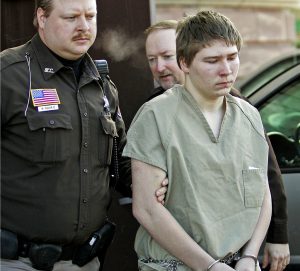US Supreme Court declines to hear Dassey case
By: Associated Press//June 25, 2018//

By JESSICA GRESKO
Associated Press
WASHINGTON (AP) — The U.S. Supreme Court said Monday it won’t weigh in on the case of a teenager convicted of rape and murder whose story was documented in the Netflix series “Making a Murderer.”
As is typical, the justices did not explain their decision to not take the case. The justices’ decision leaves in place a lower-court ruling against Brendan Dassey.
Dassey was 16 years old when he confessed to Wisconsin authorities that he had joined his uncle in raping and murdering rhw photographer Teresa Halbach before burning her body in a bonfire. Dassey’s attorneys, however, say he’s on the borderline of being intellectually disabled and was pressured into a false confession. They wanted his confession thrown out and a new trial to be held.
Wisconsin officials had called on the Supreme Court not to take the case, telling the court it shouldn’t second-guess Wisconsin courts’ finding that Dassey’s confession was voluntary. Prosecutors noted that Dassey’s mother had given investigators permission to speak to him, that Dassey had agreed as well and that during the interview investigators used only standard techniques such as adopting a sympathetic tone and encouraging honesty.
Dassey’s attorneys can still try to get him a new trial but they’d have to convince a judge that newly discovered evidence warrants one.
The Supreme Court’s decision comes as there are plans for a second season of “Making a Murderer,” which premiered on Netflix in 2015. Viewers of the first season were introduced to Dassey’s uncle, Steven Avery, who spent 18 years in prison for a rape before DNA testing exonerated him. After his release, he filed a multi-million dollar civil suit over his conviction. But in 2005, as that lawsuit was pending, he was arrested Halbach’s murder and later convicted of having committed it. Avery maintains he was framed.
At Dassey’s separate trial, video as shown of him speaking to investigators and confessing to participating in Halbach’s rape and murder. Authorities had no physical evidence tying Dassey to the crimes, and he testified that his confession was “made up.” Still, the jury convicted him. He’s up for parole in 2048.
Although Wisconsin courts ruled Dassey’s confession was made voluntarily, a federal magistrate judge and a three-judge appeals court panel disagreed, saying he should be retried or released from prison. Then, in late 2017, the full appeals court ruled 4-3 that the state courts’ determination that Dassey’s confession was voluntary was reasonable, meaning there should be no release or retrial. The Supreme Court’s announcement that it wouldn’t take the case left that decision in place.
Legal News
- State Bar leaders remain deeply divided over special purpose trust
- Former Wisconsin college chancellor fired over porn career is fighting to keep his faculty post
- Pecker says he pledged to be Trump campaign’s ‘eyes and ears’ during 2016 race
- A conservative quest to limit diversity programs gains momentum in states
- Wisconsin prison inmate pleads not guilty to killing cellmate
- Waukesha man sentenced to 30 years for Sex Trafficking
- 12-year-old shot in Milwaukee Wednesday with ‘serious injuries’
- Milwaukee man convicted of laundering proceeds of business email compromise fraud schemes
- Giuliani, Meadows among 18 indicted in Arizona fake electors case
- Some State Bar diversity participants walk away from program
- Wisconsin court issues arrest warrant ‘in error’ for Minocqua Brewing owner
- Iranian nationals charged cyber campaign targeting U.S. Companies
WLJ People
- Power 30 Personal Injury Attorneys – Russell Nicolet
- Power 30 Personal Injury Attorneys – Benjamin Nicolet
- Power 30 Personal Injury Attorneys – Dustin T. Woehl
- Power 30 Personal Injury Attorneys – Katherine Metzger
- Power 30 Personal Injury Attorneys – Joseph Ryan
- Power 30 Personal Injury Attorneys – James M. Ryan
- Power 30 Personal Injury Attorneys – Dana Wachs
- Power 30 Personal Injury Attorneys – Mark L. Thomsen
- Power 30 Personal Injury Attorneys – Matthew Lein
- Power 30 Personal Injury Attorneys – Jeffrey A. Pitman
- Power 30 Personal Injury Attorneys – William Pemberton
- Power 30 Personal Injury Attorneys – Howard S. Sicula











